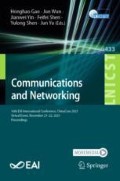Abstract
In this paper, an innovative secure communication scheme for untrusted relay systems is proposed. The source and jamming signals are jointly designed based on the selective modulation. The source signal adopts selective modulation, composed of one selection bit and one or more signal bits. The selection bit is employed to carry confidential information, while the signal bits are generated randomly and are modulated the random signal. The selection bit determines the transmit slot/frequency of signal bits, namely, the random signal. The design of the cooperative jamming signal includes two parts, adjusting the signal transmit power and rotating the signal phase. The simulation results demonstrate that our proposed scheme can make the bit error ratio of the selection bit at the untrusted relay to be 0.5. That is, there is no confidential information leakage at the relay node. Besides, the proposed scheme is superior to the Gaussian jamming signal in terms of the secrecy capacity.
Supported by National Nature Science Foundation of China (NSFC) Project 61931005.
Access this chapter
Tax calculation will be finalised at checkout
Purchases are for personal use only
References
Long, H., Xiang, W., Li, Y.: Precoding and cooperative jamming in multi-antenna two-way relaying wiretap systems without eavesdroppers channel state information. IEEE Trans. Inf. Forensics Secur. 12(6), 309–1318 (2017)
Xie, W., Liao, J., Yu, C., Zhu, P., Liu, X.: Physical layer security performance analysis of the FD-based NOMA-VC System. IEEE Access 7, 115568–115573 (2019)
Lin, Z., Wang, L., Cai, Y., Yang, W., Yang, W.: Robust secure switching transmission in MISOSE relaying networks with channel uncertainty. In: 2015 International Conference on Wireless Communications Signal Processing, pp. 1–6. IEEE, Nanjing (2015)
Sinha, R., Jindal, P.: Performance analysis of cooperative schemes under total transmit power constraint in single hop wireless relaying system. In: 2016 2nd International Conference on Communication Control and Intelligent Systems, pp. 28–31. IEEE, Mathura (2016)
Divya, T., Gurrala, K. K., Das, S.: Performance analysis of hybrid decode amplify-forward (HDAF) relaying for improving security in cooperative wireless network. In: 2015 Global Conference on Communication Technologies, pp. 682–687. IEEE, Thuckalay (2015)
Oohama, Y.: Capacity theorems for relay channels with confidential messages. In: 2007 IEEE International Symposium on Information Theory, pp. 926–930. IEEE, Nice (2007)
He, X., Yener, A.: Two-hop secure communication using an untrusted relay: a case for cooperative jamming. In: IEEE GLOBECOM 2008–2008 IEEE Global Telecommunications Conference, pp. 1–5. IEEE, New Orleans (2008)
Mekkawy, T., Yao, R., Tsiftsis, T.A., Xu, F., Lu, Y.: Joint beamforming alignment with suboptimal power allocation for a two-way untrusted relay network. IEEE Trans. Inf. Forensics Secur. 13(10), 2464–2474 (2018)
Zhang, L., Long, H., Huang, L.: Precoding and destination-aided cooperative jamming in MIMO untrusted relay systems. In: 2020 IEEE/CIC International Conference on Communications in China, pp. 605–610. IEEE, Chongqing (2020)
Li, Q., Yang, L.: Artificial noise aided secure precoding for MIMO untrusted two-way relay systems with perfect and imperfect channel state information. IEEE Trans. Inf. Forensics Secur. 13(10), 2628–2638 (2018)
Zhang, Q., Gao, Y., Zang, G., Zhang, Y., Sha, N.: Physical layer security for cooperative communication system with untrusted relay based on jamming signals. In: 2015 International Conference on Wireless Communications Signal Processing (WCSP), pp. 1–4. IEEE, Nanjing (2015)
Liu, Y., Li, L., Pesavento, M.: Enhancing physical layer security in untrusted relay networks with artificial noise: a symbol error rate based approach. In: 2014 IEEE 8th Sensor Array and Multichannel Signal Processing Workshop (SAM), pp. 261–264. IEEE, La Coruna (2014)
Xu, H., Sun, L., Ren, P., Du, Q.: Securing two-way cooperative systems with an untrusted relay: a constellation-rotation aided approach. IEEE Commun. Lett. 19(12), 2270–2273 (2015)
Author information
Authors and Affiliations
Corresponding author
Editor information
Editors and Affiliations
Rights and permissions
Copyright information
© 2022 ICST Institute for Computer Sciences, Social Informatics and Telecommunications Engineering
About this paper
Cite this paper
Huang, L., Wu, X., Long, H. (2022). Selective Modulation and Cooperative Jamming for Secure Communication in Untrusted Relay Systems. In: Gao, H., Wun, J., Yin, J., Shen, F., Shen, Y., Yu, J. (eds) Communications and Networking. ChinaCom 2021. Lecture Notes of the Institute for Computer Sciences, Social Informatics and Telecommunications Engineering, vol 433. Springer, Cham. https://doi.org/10.1007/978-3-030-99200-2_27
Download citation
DOI: https://doi.org/10.1007/978-3-030-99200-2_27
Published:
Publisher Name: Springer, Cham
Print ISBN: 978-3-030-99199-9
Online ISBN: 978-3-030-99200-2
eBook Packages: Computer ScienceComputer Science (R0)

